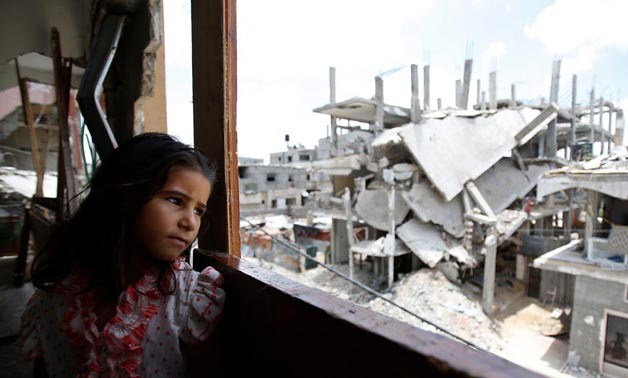
A Palestinian girl stands in a damaged building - photo courtesy of UN official website - RESIZED
CAIRO – 6 June 2017: On the memory of the 1967 Israeli occupation of Palestine, the UN Secretary-General António Guterres reiterated a call to establish an independent Palestinian state.
In his statement on the 50 year occupation on June 5, the SG said, “Now is the time to end the conflict by establishing an independent Palestinian state, living side by side in peace and security with the State of Israel.”
The SG added, “On 14 May 1948, the State of Israel was born. Almost seven decades later, the world still awaits the birth of an independent Palestinian state. In 1947, on the basis of UN General Assembly Resolution 181, the world recognized the two-state solution and called for the emergence of ‘independent Arab and Jewish states.’”
The Arab-Israeli war in 1967 resulted in Israel’s occupation of the West Bank, East Jerusalem, Gaza and the Syrian Golan and the displacement of hundreds of thousands of Palestinians and Syrians. The statement added that the occupation has imposed a heavy humanitarian and development burden on the Palestinian people.
Generations of Palestinians have been compelled to grow-up and live in crowded refugee camps, many in abject poverty, and with little or no prospect of a better life for their children.
The SG added that the occupation has shaped the lives of both Palestinians and Israelis. It has fuelled recurring cycles of violence and retribution. Its perpetuation is sending an unmistakable message to generations of Palestinians that their dream of statehood is destined to remain just that, a dream; and to Israelis that their desire for peace, security and regional recognition remains unattainable.
The SG reiterated his offer to work with all relevant stakeholders to support a genuine peace process through direct negotiations to end the occupation and achieve a negotiated two-state, as the only way to meet Israeli security needs and Palestinians inalienable rights of statehood and sovereignty.
Resolving the Israeli-Palestinian conflict will remove a driver of violent extremism and terrorism in the Middle East and open the doors to cooperation, security, prosperity and human rights for all.
Marking the occasion, the UN agencies working in Palestine published statements and reports on the status of Palestinian people 50 years after the 1967 occupation. The publications confirmed that the Israeli constraints on movement and economics together with the forced blockade on the Gaza Strip and internal political strife are at the root of Palestinian suffering.
Quoting David Carden, the head of the UN office for the Coordination of humanitarian Affairs (UNOCHA) in the Palestine humanitarian overview 2016 – “Fragmented Lives”: “At its heart, the crisis in the oPt [Occupied Palestinian Territory] is one of a lack of protection for Palestinian civilians– from violence, from displacement, from restrictions on access to services and livelihoods, and from other rights violations – with a disproportionate impact on the most vulnerable, children in particular.”
According to OCHA, Israeli authorities in 2016 demolished or seized some 300 donor-funded structures provided as humanitarian aid to Palestinians, with a value estimated at more than $730,000.
The International Labor Organization (ILO) described the economic and labor market situation in Palestine as “Suffocating.” The ILO said that the economic growth in West Bank and Gaza is not enough to improve livelihoods, and it barely translates into employment gains. It adds that the occupation’s control over Palestinian borders, access to land, water and natural resources complicates all efforts to strengthen the Palestinian labor market. This leaves more than one-quarter of the Palestinian labor force unemployed, whereby unemployment rising up to 40 percent among young people. The situation is “particularly dire” for the two million Palestinians living in Gaza, where 60 percent of youth with school degrees are jobless, and where movement for work is next to impossible.
The ILO warned that as work prospects bleaker for Palestinian youth, the frustrations can fuel radicalization and violence. It called for the promotion and application of social justice and decent work opportunities as a vital mean of peace efforts. The agency urged the international community to stay engaged in the Middle East, with a view to fostering peace and full statehood for the Palestinians.

Comments
Leave a Comment